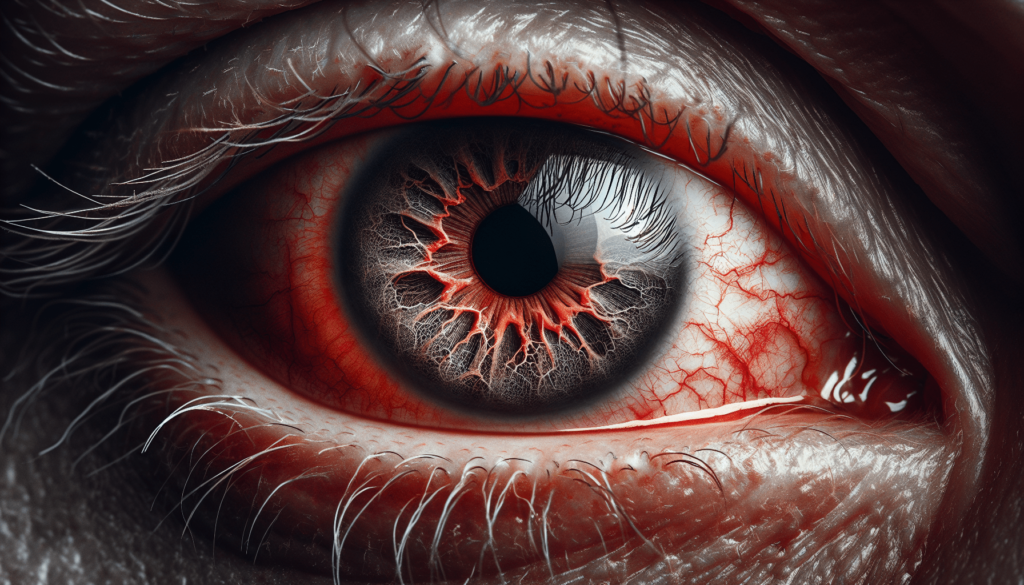Have you ever experienced the sensation of dry, gritty eyes that just won’t seem to go away? The feeling of irritation and discomfort can be frustrating, affecting your ability to focus and go about your day with ease. In this article, we will explore the common symptoms and causes of dry eyes, as well as simple solutions to help alleviate the discomfort and restore moisture to your eyes. So sit back, relax, and discover what it truly feels like to have dry eyes.
What Does It Feel Like To Have Dry Eyes?
Have you ever experienced the discomfort of dry eyes? If so, you’re not alone. Many people suffer from dry eye syndrome, which can cause a variety of symptoms that impact your daily life. In this article, we’ll explore what it feels like to have dry eyes, as well as the potential causes and treatment options available to help you find relief.
Understanding Dry Eye Syndrome
When you have dry eyes, your eyes may not produce enough tears or the tears they do produce may evaporate too quickly. This can lead to a range of symptoms, including:
- Dryness
- Irritation
- Burning or stinging
- Grittiness or feeling like there’s something in your eye
- Excessive tearing
- Sensitivity to light
If you’re experiencing any of these symptoms, it’s important to consult with an eye care professional to determine the cause and appropriate treatment.
The Sensation of Dryness
The most common symptom of dry eyes is a feeling of dryness or discomfort. It can be likened to the sensation of having something in your eye that you can’t quite get rid of. This can be particularly bothersome, especially if it persists throughout the day and interferes with your ability to focus or perform daily tasks.
When your eyes are dry, blinking may not provide the relief you need, and you may find yourself constantly rubbing your eyes in an attempt to alleviate the discomfort. This can further irritate the eyes and exacerbate the problem, leading to a frustrating cycle of dryness and discomfort.
Irritation and Redness
In addition to feeling dry, your eyes may also become irritated and red. This can be due to inflammation caused by the lack of adequate tear production or poor tear quality. The irritation and redness may be accompanied by a burning or stinging sensation, which can make it difficult to concentrate or go about your daily activities.
If you have dry eyes, you may also notice that your eyes appear bloodshot or tired, even if you’re well-rested. This can be a source of embarrassment, especially if others comment on the appearance of your eyes or if it affects your self-esteem.
Grittiness and Foreign Body Sensation
Another common symptom of dry eyes is a sensation of grittiness or feeling like there’s something in your eye. This can be uncomfortable and make it difficult to keep your eyes open or focus on tasks that require visual concentration.
The grittiness may be accompanied by a foreign body sensation, as if there’s a particle or debris trapped in your eye. This can be irritating and lead to further eye rubbing, which can worsen the dryness and discomfort you’re experiencing.
Excessive Tearing
While dry eyes are typically associated with a lack of tears, some people with this condition may experience excessive tearing. This can be confusing and counterintuitive, as it may seem like your eyes are producing too many tears rather than too few.
Excessive tearing in response to dry eyes is a result of the eye’s natural response to irritation and discomfort. Your eyes may try to compensate for the lack of adequate tears by overproducing tears, which can lead to watery eyes and blurred vision.
Sensitivity to Light
People with dry eyes may also experience sensitivity to light, known as photophobia. This can make it uncomfortable to be in bright lights or sunlight, and you may find yourself squinting or avoiding light sources to reduce the discomfort.
If you’re sensitive to light due to dry eyes, wearing sunglasses or using tinted glasses can help alleviate the symptoms and make it easier for you to be in bright environments. It’s important to protect your eyes from excessive light exposure to prevent further irritation and discomfort.
Causes of Dry Eyes
Dry eye syndrome can have a variety of causes, including:
- Age-related changes
- Medical conditions such as autoimmune diseases
- Medications that reduce tear production
- Environmental factors like dry or windy conditions
- Prolonged screen time or digital device use
If you have dry eyes, it’s important to identify the underlying cause so that you can receive appropriate treatment. Your eye care professional can perform a comprehensive eye exam to determine the cause of your dry eyes and recommend the most effective treatment options.
Treatment Options for Dry Eyes
There are several treatment options available to help manage dry eye syndrome and alleviate your symptoms. These may include:
- Artificial tear drops to lubricate the eyes
- Prescription eye drops to reduce inflammation
- Punctal plugs to block tear drainage and keep the eyes moist
- Warm compress therapy to improve tear quality
- Dietary supplements like omega-3 fatty acids to support eye health
Your eye care professional can recommend the most appropriate treatment based on the underlying cause of your dry eyes and the severity of your symptoms. It’s important to follow their recommendations and attend regular follow-up appointments to monitor your progress and adjust treatment as needed.
Lifestyle Changes for Managing Dry Eyes
In addition to medical treatments, there are several lifestyle changes you can make to help manage dry eyes and reduce your symptoms. These may include:
- Taking regular breaks from digital devices to reduce eye strain
- Using a humidifier in dry indoor environments
- Avoiding exposure to smoke and air pollutants
- Wearing protective eyewear in windy or dusty conditions
- Maintaining good overall health through a balanced diet and regular exercise
By incorporating these lifestyle changes into your daily routine, you can support your eye health and reduce the impact of dry eyes on your quality of life. It’s important to be proactive in managing your dry eye symptoms and to seek help from your eye care professional if you’re experiencing persistent discomfort.
Conclusion
Having dry eyes can be a frustrating and uncomfortable experience, but with the right treatment and lifestyle changes, you can find relief and improve your quality of life. By understanding the symptoms and causes of dry eye syndrome, you can work with your eye care professional to develop a treatment plan that addresses your unique needs and helps you maintain healthy, comfortable eyes.
If you’re struggling with dry eyes, don’t hesitate to seek help and explore the treatment options available to you. Your eyes are precious, and it’s important to take care of them to ensure clear vision and optimal eye health. Remember, you’re not alone in dealing with dry eyes, and there are resources and support available to help you find relief.

